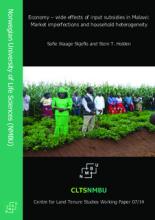Land Library
Welcome to the Land Portal Library. Explore our vast collection of open-access resources (over 74,000) including reports, journal articles, research papers, peer-reviewed publications, legal documents, videos and much more.
/ library resources
Showing items 55 through 63 of 118.Climate risk represents an increasing threat to poor and vulnerable farmers in drought-proneareas of Africa. This study assesses the maize and fertilizer adoption responses of food insecure farmers in Malawi, where Drought Tolerant (DT) maize was recently introduced.
Well before the effective ending of the protracted Lord’s Resistance Army (LRA)
insurgency in northern Uganda in July 2006, and at a time when the entire rural
population was displaced into camps, concerns had emerged around land, in particular
The constitution and enabling legislation in Uganda, as in many other countries, empower the government to acquire land in the public interest.
The Uganda National Land Policy (NLP) Implementation Action Plan is a deliberate resolution by the Government of Uganda to address major challenges that have hindered the implementation of land reforms, thereby impeding the optimal utilisation of land for socio-economic development and transforma
The Karamoja region in Northeastern Uganda, covering an area of 27,200 square kilometers, is inhabited by around 1.2 million people who live in seven districts; Moroto, Nakapiripirit, Napak, Amudat, Abim, Kotido and Kaabong.
This report documents agricultural household models developed for agricultural policy analyses related to the assessment of impacts of agricultural input subsidies and maize technology choices in Malawi.
The potential benefits of providing subsidized inputs to farm-households in developing countries may reach well beyond the targeted households. More specifically, increased food productionand demand for rural labor may benefit poor households through lower food prices and higherrural wages.
Lab-in-the-field Hawk-Dove game experiments were played by spouses in a rural sample of households in Southern Ethiopia where women/wives traditionally have a weak position.
We have investigated whether joint land certification in Southern Ethiopia has contributed to a strengthening of the perceived land rights of women and an increase in their intra-household involvement in land-related decisions.









